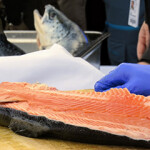EU trade arrangements will improve for shellfish, UK Fisheries Minister Victoria Prentis vows

While many members of the U.K. shellfish sector have managed to adapt very well to the new post-Brexit trading arrangements with the E.U., Brussels’ “unjustified” decision to ban imports of live bivalve mollusks (LBMs) from class-B waters at the start of the year remains a considerable challenge, according to U.K. Fisheries Minister Victoria Prentis.
The shellfish ban came as part of the E.U.-U.K. Trade and Cooperation Agreement (TCA) that entered into force on 1 January, 2021. The situation in the five months since has left many producers unable to send products to many of the markets that they had been supplying before Brexit, and thereby putting their businesses at risk.
“I know how difficult and challenging the last few months in particular have been for all of you. Our exit from the E.U. has presented unique challenges for this sector, which have been made even harder by the context of the coronavirus pandemic,” Prentis said, speaking on the first day at the 51st annual conference of the Shellfish Association of Great Britain (SAGB). “These are not easy times for the industry.”
The minister explained to delegates that both the Seafood Export Working Group and the Scottish Seafood Task Force have been working very closely with parts of the industry to identify trade issues and to get used to new paperwork and requirements, as well as to eliminate some of the “mundane and irritating” issues that businesses faced at the beginning of the year.
“We continue to streamline the process wherever possible,” she said. “However, I know that many of you are experiencing more fundamental problems. The decision taken by the E.U. to ban the export of live bivalve mollusks from class-B waters is wrong. It’s unfair; it’s unjustified, and I want you to know that we in DEFRA will continue to help you in any way that we can.”
Prentis explained that the E.U., in the form of the European Commission, continues to be “unwilling to engage in constructive discussion on this,” and so the U.K. government is speaking to individual member states who want the trade to continue.
“I do not think the Commission has taken the right approach with this. I think that the bivalves that we have always exported are delicious and safe and that this was a good way to export and trade. I want to do everything that I can to help that continue in the future,” Prentis said. “I’m not going to pretend that there is a silver bullet; there isn’t. But we are taking a range of steps that I hope will make some difference. The Trade and Cooperation Agreement has now finally been ratified by the E.U. and we will now at last see the new specialized committees being set up, which is an important step forward in making a future relationship with the Commission that deals with practical issues.”
The minister also highlighted that exports of class-A and depurated LBMs are able to continue in closed and labelled packages, while a review of class-B shellfish harvesting areas in England and Wales will be conducted.
“It is our priority to help you adapt to the new conditions that we find ourselves in – and understand the needs of your individual businesses. That includes helping you to find new markets and improving water quality. We are absolutely committed to improving water quality and are investigating which actions would deliver the greatest benefits for shellfish harvesting waters,” Prentis said.
She said she is hopeful that the situation is on its way to improvement.
“I’m in no way downplaying the difficulties, but I really hope that the situation will start to improve and that with constructive and through fairly frank engagement, we can work together to ensure that this industry has a future,” Prentis said. “I am confident that we have wonderful products that consumers across the world will want.”
With regards to general fishing policy, the minister said that the Fisheries Act 2020 will play an important role in enabling the U.K. to function as an independent coastal state with regulatory autonomy.
Working together with the devolved administrations, one of the key priorities will be the preparation of a Joint Fisheries Statement, she said. This will set out how the fisheries administrations will deliver policies to meet the objectives of the Fisheries Act.
Stakeholders will be able to contribute to the development of the statement.
“The act also gives DEFRA and the devolved administrations a responsibility to develop Fisheries Management Plans, and these will help transform how we manage our fisheries and allow us to move away from regimes such as Western Waters,” Prentis said.
Photo courtesy of UK Parliament






Share